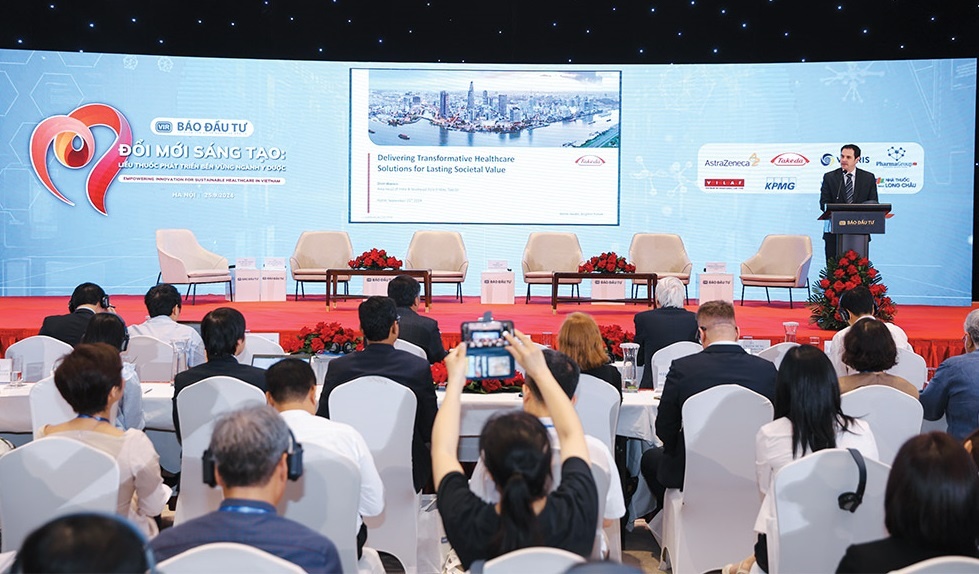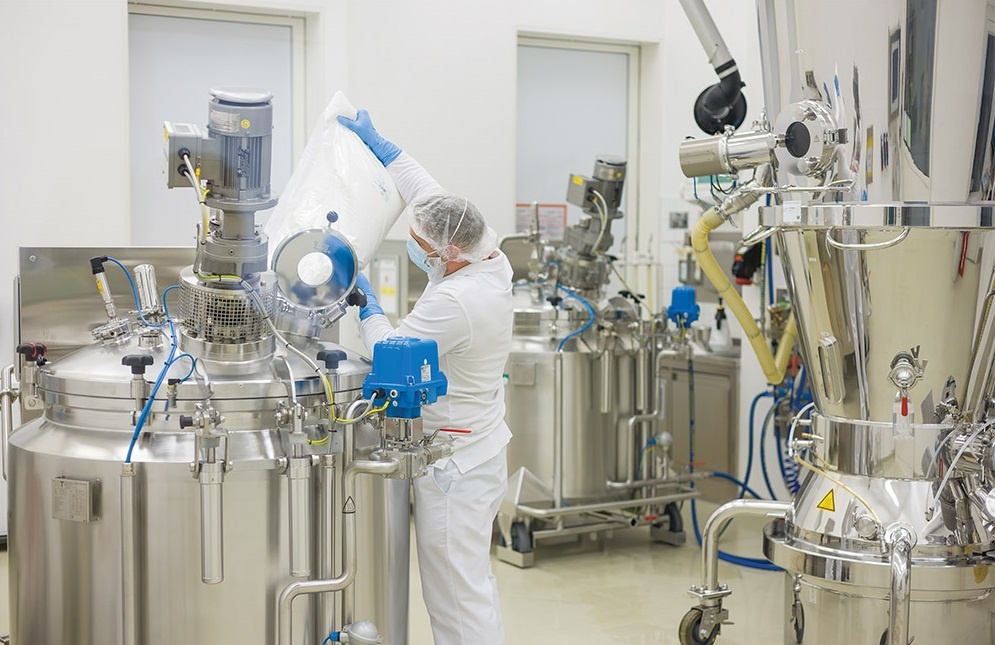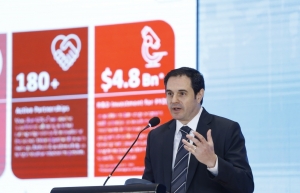Takeda’s partnerships to deliver innovative medicine and vaccines
At VIR’s health conference in September, Dion Warren, area head for India and Southeast Asia at Takeda, shared the company’s journey to deliver transformative healthcare solutions for lasting societal value.
“Takeda is committed to innovating sustainably for a healthier future in Vietnam, with a focus on broadening access to medicine and vaccines, and strengthening partnerships for public health,” said Warren. “We strongly believe in the value of public-private partnerships (PPPs) to jointly build a more sustainable healthcare system and enhance patient access to safe and effective prevention and treatment methods.”
 |
| Takeda has been collaborating with the MoH and frontline medical units |
Innovation a must in healthcare
At the event, policymakers, leading experts, and the business community highlighted the importance of innovation and PPP for the sustainable development of the medical and pharmaceutical industry in Vietnam.
Do Xuan Tuyen, Deputy Minister of Health said, “This is not only a matter of industry development but also closely linked to social benefits to ensure better healthcare for the people. Innovation in the healthcare sector is closely linked to socioeconomic development, ensuring social security in the new era.”
In recent times, the Ministry of Health has been determined to complete a large amount of work on perfecting policy mechanisms, resolving challenges that the health system is facing in order to create a favourable environment to promote investment in a sustainable and innovative health system. This includes the Law on Medical Examination and Treatment, the draft amendment to a number of articles of the Law on Health Insurance, and draft amendments to the Law on Pharmacy, Tuyen added.
As one of the world’s fastest-growing economies, Vietnam aims to rank among the top nations in the region in testing, researching, and producing high-quality drugs, with a goal of adding over $20 billion to the country’s GDP by 2045. A fresh strategy that fosters an enabling environment to develop the medical and pharmaceutical industry focusing on innovation, technological advancement, and digital transformation is seen as a crucial factor to success.
At the conference, experts and business leaders agreed that Vietnam has made great strides in the medical and pharmaceutical industry. The nation’s strategy for protection, care, and improvement of the people’s health by 2030 with a vision towards 2045 has outlined the overall targets. Accordingly, all people will have access to quality healthcare services, live in safe communities, can develop both physically and mentally, and contribute to livelihood improvements.
One of the main viewpoints is that the healthcare system is innovated and developed to ensure equality, efficiency, quality, accountability, sustainability, and resilience, with an aim to cover the entire population. Specific targets include a focus on scientific research, application of high technologies to prevention, discovery, diagnosis, and treatment of diseases, research and development of pharmaceuticals and medical devices, enhancing digital transformation, and emphasising the role of IT.
However, Vietnam is facing a number of difficulties to unlock healthcare and medical innovation. Thus, collaborative efforts among relevant stakeholders, especially between businesses, government agencies, and social organisations, are vital to changing the situation.
Takeda’s collaborative efforts
Innovation and sustainability are key elements in the development of Vietnam’s medical and pharmaceutical sector, and essential to ensuring patient access to advanced drugs and vaccines. With a rich heritage in innovations and extensive global experiences, multinational biopharmaceutical company Takeda has been a dedicated healthcare partner in Vietnam for over a decade in contributing impactful public health impact to the country.
Since 2021, Takeda has been collaborating with the Ministry of Health (MoH) and frontline medical units, such as the National Institute of Haematology and Blood Transfusion, to strengthen the capacity of diagnosis and management for hereditary angioedema.
In 2022 and 2023, Takeda partnered with the Bright Future Fund to fill gaps in knowledge about disease and treatment options among haematology cancer patients, and serve as a bridge between doctors, caregivers, and patients, as well as providing consultation services to patients.
On the occasion of Rare Disease Day in February this year, Takeda once again reinforced its commitment to standing with the rare disease community. The company signed an MoU on rare diseases with the MoH’s Medical Service Administration, together with Roche, Novartis, and Sanofi, to improve the quality of rare disease diagnosis and treatment. The partnership aims to ease the burden of health inequities and create positive change so that everyone may one day receive optimal care.
In an attempt to raise awareness of haematological cancers like lymphoma and multiple myeloma, Takeda has also joined forces with the National Institute of Haematology and Blood Transfusion to strengthen the capacity of haematology and oncology experts.
 |
| The firm is committed to expanding vaccine coverage and boosting application of high technology |
Embarking on a new era of dengue prevention
Another milestone was marked in May 2024, as Takeda’s dengue vaccine was approved by the MoH for use in Vietnam. As Vietnam’s first approved dengue vaccine, the innovation provides a proactive and sustainable prevention tool to Vietnam’s integrated dengue management strategy. Takeda’s goal is to improve public health by delivering a safe and effective vaccine to reduce the burden of dengue globally, including in Vietnam.
Takeda’s Dion Warren said increasing vaccination coverage is a top priority in the company’s infectious disease prevention strategy. This is particularly true as dengue fever is placing a heavy burden on both the healthcare system and the national economy.
“We are committed to expanding dengue vaccine coverage nationwide in the coming time and increasing drug access to the remote areas and low-income patients. To facilitate this goal, we will foster PPPs with health authorities, universities, research institutes, and partners, as well as public and private vaccination centres to increase coverage,” Warren explained.
In addition, these partnerships aim to raise awareness about dengue and the importance of vaccination, advocate for sustainable management policies, and provide comprehensive training for healthcare professionals in vaccination practices, added Warren.
Takeda’s dengue vaccine has been approved in more than 40 countries, and is also accessible through public vaccination programmes in Indonesia, Brazil, and Argentina.
 | Takeda dengue vaccine approved in Vietnam The Drug Administration of Vietnam (DAV) on May 14 issued a decision approving dengue vaccine of Takeda Pharmaceutical Company Limited, becoming the first dengue vaccine approved in the country for use in individuals from four years of age, regardless of previous dengue exposure and without the need for pre-vaccination testing. |
 | Takeda delivering transformative healthcare solutions At the VIR health conference- "Empowering health innovation for sustainability vision" held on September 25, 2024, Dion Warren – area head of India and Southeast Asia (I-SEA) of Takeda, emphasised Takeda's commitment in delivering transformative healthcare solutions for lasting social value. |
 | Takeda honoured for contributions to Vietnam's sustainable development With over a decade of groundbreaking innovative solutions in Vietnam's pharmaceutical sector, Takeda has been recognised for its contribution to sustainable development. |
What the stars mean:
★ Poor ★ ★ Promising ★★★ Good ★★★★ Very good ★★★★★ Exceptional
Related Contents
Latest News
More News
- Ho Chi Minh City launches plan for innovation and digital transformation (February 25, 2026 | 09:00)
- Vietnam sets ambitious dairy growth targets (February 24, 2026 | 18:00)
- Masan Consumer names new deputy CEO to drive foods and beverages growth (February 23, 2026 | 20:52)
- Myriad risks ahead, but ones Vietnam can confront (February 20, 2026 | 15:02)
- Vietnam making the leap into AI and semiconductors (February 20, 2026 | 09:37)
- Funding must be activated for semiconductor success (February 20, 2026 | 09:20)
- Resilience as new benchmark for smarter infrastructure (February 19, 2026 | 20:35)
- A golden time to shine within ASEAN (February 19, 2026 | 20:22)
- Vietnam’s pivotal year for advancing sustainability (February 19, 2026 | 08:44)
- Strengthening the core role of industry and trade (February 19, 2026 | 08:35)

 Tag:
Tag:




















 Mobile Version
Mobile Version